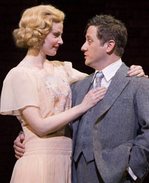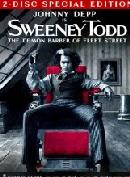HOME PAGE
SITE GUIDE
SEARCH
ADVERTISING AT CURTAINUP
REVIEWS
FEATURES
NEWS
Etcetera and
Short Term Listings
LISTINGS
Broadway
Off-Broadway
NYC Restaurants
BOOKS and CDs
OTHER PLACES
Berkshires
London
California
New Jersey
Philadelphia
Elsewhere
QUOTES
TKTS
PLAYWRIGHTS' ALBUMS
LETTERS TO EDITOR
FILM
LINKS
MISCELLANEOUS
Free Updates
Masthead
Writing for Us
A CurtainUp Los Angeles Review
Minsky's
| My Mama told me to Keep It Clean.— Chorus Girls
|

Katharine Leonard and Christopher Fitzgerald
in Minsky's
(Photo: Craig Schwartz) |
Billy Minsky's credo that the country in the midst of the 1930 depression wanted escapist undemanding fun strikes a familiar chord in today's audiences and he may be right again. The theme of a burlesque guy who falls in love with a reforming girl (think Mission Doll Sarah Browne in Guys and Dolls), along with the efforts of Minsky to evade being shut down, offers no surprises. Like burlesque, the most surprising moments in the show are when the chorine whips off her bra again.
Director/choreographer Casey Nicholaw and Book Writer Bob Martin are veterans of the Tony-winning The Drowsy Chaperone which glorified 1920s musicals. This show lacks Man in Chair, the stage-struck lonely guy who gave Drowsy a soul, but it's true to form, both musically and in content which gives it a purity all its own on its own level. There are those funny/terrible vaudeville jokes, such as a cop's gun going off whenever the words spontaneous discharge are uttered and that pie in the face scene starring the commandingly comical George Wendt which we've seen a thousand times before but which Wendt makes as fresh as the joke is stale. Opening night one of the pies missed Wendt and hit Beth Leavel. I have a feeling they'll leave that in.
Charles Strouse who wrote the music hasn't come up with anything as memorable as his tunes for Bye Bye Birdie or his anthems for Annie but the B-list tunes seem appropriate for this B-list art form. The most delicious number is "I Want A Life " in which superbly nebbishy characters Jason (John Cariani) and Beula (Rachel Dratch) yearn to live where people don't sing or dance and where a house is a home, among other wonderful lyrics by the show's lyricist Susan Birkenhead.
The best part of the show is its revelation of show biz roots. The opening number traces the evolution of a drab song "Waking Up" to a Minsky-inspired "Working Hot" which climaxes (a word that just naturally comes to mind here) in the girls "getting into their costumes" by whipping off their dresses to dance in spangled mini-bikinis. It's a great opening number and is seconded didactically by "Every Number Needs A Button" which demonstrates such various kicky clichés as getting the hook, the bump, the plank, etc.
"Home" may be the most memorable song, not because of its music but because of its sentiment that for an actor the theater is home. It's a song that can be trotted out when something more sentimental than "There's No Business Like Show Business" ;is called for.
Nicholaw's bright brisk choreography includes a tap-dance number that opens the second act. At two hours 45 minutes, Minsky's could use some trimming and Act II, less strong than Act I, is the place to do it.
The show is a visual treat. Minsky may complain about Ziegfeld but this production out-Ziegfelds the Master with gorgeous costumes by Gregg Barnes and a scenic design by Anna Louizos that catches 1930 in its interior café scenes.
The cast is swell, headlined by Christopher Fitzgerald as a lovable Billy Minsky, Katharine Leonard as his pretty blonde sweetheart Mary, Tony-winner Beth Leavel in a dynamite performance as Billy's stage manager Maisie, Gerry Vichi as the elderly actor Scratch who, both in person and in character, carries stage history proudly on and George Wendt, who manages to be both sly and overpowering as the picketing politician who wants to get those naked ladies off stage forever.But not just yet.
Minsky's is headed for Broadway this spring to find out if, as Billy Minsky says of his beloved burlesque, "people are willing to sit in a hot theater and listen to old jokes."
|
Minsky's Book: Bob Martin. Music: Charles Strouse. Lyrics: Susan Birkenhead. Original Book: Evan Hunter. Based on Bud Yorkin-Norman Lear production The Night They Raided Minsky's written by Arnold Shulman, Sidney Michael, Norman Lear, directed by William Friedkin, from the book by Rowland Barber Director/Choreographer: Casey Nicholaw Cast: Christopher Fitzgerald (Billy Minsky), Kevin Cahoon (Buster), Beth Leavel (Maisie), Megan Nichole Arnoldy, Roxane Barlow, Jennifer Bowles, Jennifer Frankel, Sabra Lewis, Ariel Reid, Angie Schworer, Sarrah Strimel (The Girls), Paul Vogt (Boris), John Cariani (Jason Shimpkin), Gerry Vichi (Scratch), Kirsten Bracken (Flame), Blake Hammond (Sgt. Crowley, Dr. Vinkle), Katharine Leonard (Mary Sumner), Matt Loehr (Dr. Vankle), Patrick Wetzel (Blind Man), George Wendt (Randolph Sumner), Philip Hoffman (Mr. Freitag, Judge), Rachel Dratch (Beula), Jeffrey Schecter, Stacey Todd Holt (Reporters), Ensemble: Megan Nicole Arnoldy, Nathan Balser, Roxane Barlow, Jennifer Bowles, Kirsten Bracken, Jennifer Frankel, Linda Griffin, Blake Hammond, Philip Hoffman, Stacey Todd Holt, Sabra Lewis, Matt Loehr, Ariel Reid, Jeffrey Schechter, Angie Schworer, Sarrah Strimel, Charlie Sutton, Patrick Wetzel Scenic Design: Anna Louizos Costume Design: Gregg Barnes Lighting Design: Ken Billington Sound Design: Acme Sound Partners Hair Design: Josh Marquette Orchestrations: Doug Besterman Music Arrangements: Glen Kelly Production Stage Manager: Karen Moore Running Time: Two hours 45 minutes, one intermission Running Dates: January 21-March 1, 2009 Where: The Ahmanson Theatre, 135 N. Grand Ave., Los Angeles. Reservations: (213) 628-2772 Reviewed by Laura Hitchcock on February 6, 2009. |
|
Musical Numbers
| |
Act One
|
Act Two
|
|
REVIEW FEEDBACK Highlight one of the responses below and click "copy" or"CTRL+C"
Paste the highlighted text into the subject line (CTRL+ V): Feel free to add detailed comments in the body of the email. . .also the names and emails of any friends to whom you'd like us to forward a copy of this review. You can also contact us at Curtainup at Facebook or Curtainup at Twitter |







